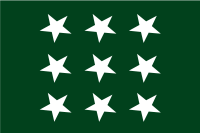Islami Jamhoori Ittehad
Islamic Democratic Alliance اسلامی جمہوری اتحاد | |
|---|---|
 | |
| Leader | Nawaz Sharif |
| Founder | Ghulam Mustafa Jatoi |
| Founded | 1988 |
| Dissolved | 1990 |
| Succeeded by | Pakistan Muslim League (N) |
| Headquarters | Parliament lodges, Islamabad. |
| Ideology |
Conservatism Capitalism Muslim nationalism |
| Political position | Right-wing |
| Colors |
Green |
| Parliament |
106 / 207 |
| Party flag | |
 | |
The Islami Jamhoori Ittehad (or IJI) English lit. Islamic Democratic Alliance, Acronym:(IDA, IJI) (Urdu: اسلامی جمہوری اتحاد) was a largest right-wing conservative alliance formed in September 1988 to oppose the democratic socialist Pakistan Peoples Party in elections that year. The alliance comprised nine parties, of which the major components were the Pakistan Muslim League (PML), National Peoples Party (NPP), Jamaat-e-Islami (JI), with PML accounting for 80% of the IJI's electoral candidates. The ISI under its director Hamid Gul had a major role in forming the center-of-right political alliance.[1][2] Care had been taken to ensure that the alliance comprised nine parties to generate comparison with the nine-party Pakistan National Alliance (PNA) that had campaigned against Zulfikar Ali Bhutto in 1977.[3]
The head of the party was Ghulam Mustafa Jatoi, but its most resourceful leader was Nawaz Sharif, a young industrialist whom Zia ul-Haq had appointed chief minister of Punjab. Sharif was vying for control of the Pakistan Muslim League, which was headed at that time by former Prime Minister Muhammad Khan Junejo.[4]
It won only fifty-three seats in the National Assembly, compared with ninety-two won by the PPP. Most IJI seats were won in Punjab. Nawaz Sharif emerged from the 1988 elections as the most powerful politician outside the PPP. In December 1988, he succeeded in forming an IJI administration in Punjab and became the province's chief minister. It was from this power base that he waged the political battles that eventually led to his becoming prime minister in 1990. In the supercharged atmosphere of the 1990 elections, the electorate surprised observers. Neither the IJI nor the PPP was expected to come up with a firm mandate to rule. Yet the IJI received a strong mandate to govern, winning 105 seats versus forty-five seats for the Pakistan Democratic Alliance (PDA), of which the PPP was the main component in the National Assembly.[5] Opposition groups alleged large scale selective rigging of seats to not just ensure an IJI victory but also prevent those opposed to Military influence from being elected.[6]
In the 1993 national elections, the IJI coalition no longer existed to bring together all the anti-PPP forces. The religious parties expended most of their energies trying to form a workable electoral alliance rather than bolstering the candidacy of Nawaz Sharif, the only person capable of challenging Benazir Bhutto.
Controversies
Islami Jamhori Ittehad (IJI) was allegedly an establishment-backed political alliance against the Benazir Bhuto-led PPP, formed after doling out money to the politicians, which caused the PPP’s defeat in the said general elections. In 1993, former Air Chief Asghar Khan had moved SC against foul play in the 1990 general elections. The case is also known as Mehrangate scandal.
References
- ↑ Hameed Gul admits he formed IJI, The News (Pakistan), August 30, 2009
- ↑ Editorial: What the generals must apologise for Daily Times, February 01, 2008
- ↑ Pakistan: Between Mosque and Military by Husain Haqqani, Carnegie Endowment for International Peace, 2005, p 207.
- ↑ Pakistan: Between Mosque and Military by Husain Haqqani, Carnegie Endowment for International Peace, 2005, pp. 202–203.
- ↑ Profile: Islami Jamhoori Ittehad U.S. Library of Congress
- ↑ How an election was stolen: the PDA white paper on the Pakistan elections (1990) Peoples Democratic Alliance
Bibliography
- Husain Haqqani. Pakistan: Between Mosque and Military, Washington D.C.: Carnegie Endowment for International Peace, 2005.
See also
- Establishment (Pakistan)
- Pakistan National Alliance
- Politics of Pakistan
- History of Pakistan
- List of political parties in Pakistan